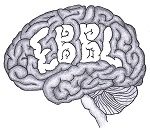Lately I’ve been finding myself thinking a lot about how scattered, behind, and under-the-gun I feel, and how little direction my research program seems to have at the moment. Writing this is my attempt to rein things in, to exert some top-down control over a bottom-up work life. Having said that, you have probably intuited that this post does *not* address the putative topic of this blog, “Emotion on the Brain.” You’re right. This post is about emotions and brains only in the sense that I’m experiencing job-related emotions and they’re on my mind (in my brain?) so I’m writing about it. Perhaps a “real” post will come next. First, though, I need to shake things loose to form a plan.
So, here’s the back story.
I recently read Stephen D. Brookfield’s book, “Becoming a Critically Reflective Teacher,” as part of a book group through our Center for Enhancing Learning and Teaching at Tufts (awesome center). In this book, Brookfield provides thoughtful suggestions about how to be critical about one’s teaching in a way that promises to improve the experience of both learning and teaching. One of the things he suggested was that teachers keep a weekly teaching log to record salient teaching moments. This enables a teacher to consider whether and how that salient moment should impact next teaching steps.
Then it occurred to me: Researchers could similarly keep a weekly research log to record salient research moments. This would enable a researcher to consider whether and how that salient moment should impact next research steps. This post is sort of my attempt to do that. My salient research moment was the realization that my research life is terrific in many ways, but it seems to be running me rather than the other way around. So, I’m going to start with a log – blog, really – that describes my research life and what I’d like to achieve next.
What is my research life?
I direct the Emotion, Brain, & Behavior Laboratory (EBBL) at Tufts. My research broadly focuses on emotion and its regulation. Having been trained as a clinical psychologist and affective neuroscientist, I am interested in understanding how emotion and emotion regulation contribute to (and/or are affected by) well-being and ill-being. On the ill-being side, studies in the lab have focused primarily on anxiety and depression. There are a few studies we’re currently running in the EBBL that directly touch on this theme:
Expressive Writing: To what extent does writing about daily stressful events in a way that encourages reappraisal promote well-being and stress resistance?
Post-Event Processing: What are the predictors and consequences of repetitively reflecting on negative aspects of socially evaluative situations after the fact?
Selection, Optimization, and Compensation with Emotion Regulation (SOC-ER) Framework: What are the resources that impact the choice to use certain emotion regulation strategies and success in doing so? How do people compensate when their emotion regulation strategy choice fails to change one’s emotions as intended?
What do I want to achieve next?
I am working now with five exceedingly talented graduate students, each of whom is working toward a Ph.D. and has her own line of research. I am also working with three exceedingly talented undergraduate students, all three of whom are completing senior honors thesis projects in the EBBL this year. I’m also collaborating with several colleagues, some who are former trainees from my lab, to varying degrees of involvement on projects that are in various stages of development, from design to manuscript preparation. (How’s that for vague?) With all these wonderful people in my research life, we’ve published a lot of great work; I’m both proud of this work and grateful to have been involved. We’ve also managed to create a pretty serious back-log of data and we’re not moving all of these data toward publication. (Bottom line: I would like to publish more of our existing data and, moving forward, develop an efficient method of publishing data in a way that eliminates back-log.)
My lab’s research is funded by a U.S. Army Natick Soldier Research, Development, and Engineering Center contract, the focus of which, stated very broadly, is to support cognition and emotion in the contextualized soldier. Most of the projects that the graduate and undergraduate students in the EBBL are working on are funded by this contract and, thus, should and do address questions in the realm cognition and emotion. We primarily collect behavioral and autonomic psychophysiological dependent measures in mostly laboratory-based experimental paradigms in which one participant at a time views stimuli on a computer monitor and follows specific instructions that prompt the target psychological processes. This has generated and will continue to generate, useful knowledge that advances the field. However, it is a limiting context that certainly does not echo the complexities of real-world emotions and their regulation. (Bottom line: I would like to use methods and measures that have even greater ecological validity and that will allow us to answer questions that are important and fundable.)
In the past, even recent past, we have used functional magnetic resonance imaging (FMRI) to collect data that sheds light on the neural circuits that underlie the psychological processes we’re studying. Many of the trainees in my lab would like to be trained to use FMRI to answer questions in this domain. But, FMRI is expensive and I do not currently have funding for scanning. (Bottom line: I would like to apply for funding to cover FMRI scanning costs so that I can answer questions about neural circuits and train students to do so too. I would also like to collaborate with others to use methods such as TDCS and EEG/ERP.)
What next?
A plan! That’s what’s next. Stay tuned.
